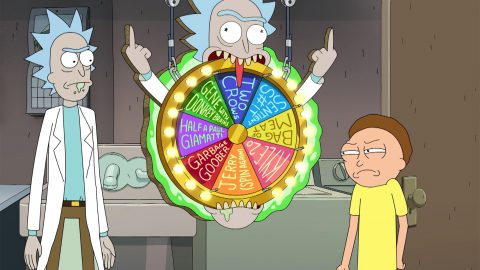
In early 2012, screenwriter Peter Straughan was speaking to a grief counsellor when his phone erupted. He’d been nominated for an Oscar for Tinker Tailor Soldier Spy, and a stream of texts was congratulating him. For Straughan, however, the news was difficult to digest. Both he and his late wife and co-writer, Bridget O’Connor, were nominated. Bridget had tragically died of cancer two years earlier and never saw the film completed.
“It was the best of times and worst of times,” says Straughan. “Bridget had already died, so there was a bittersweetness that she was getting these nominations, but she never knew. I was there to talk about the fact that I’d lost Bridget, and it was the Academy nomination for Bridget and myself. It was very odd.”
Looking back, Straughan says his memory is blurry of the film that changed his life and career. Tinker Tailor Soldier Spy was released 10 years ago to critical acclaim and surprise commercial success, winning two BAFTAs while earning three Oscar nominations (including Best Screenplay for Straughan). With an all-star cast of British actors (Gary Oldman, Colin Firth, Benedict Cumberbatch, John Hurt, Tom Hardy, Kathy Burke, Mark Strong, Ciarán Hinds and Toby Jones), it topped the British box office for three consecutive weeks.
Based on the 1974 novel by the late John le Carré, Tinker Tailor’s intricate story takes place at the height of the Cold War, as George Smiley (a never-better Oldman) attempts to flush out a Soviet mole in MI6. As Smiley meets with various MI6 employees and allies, the cruel world of espionage is revealed layer by layer in all its horror and brutality, as friends and lovers become tangled in a painful web of secrets and lies.

Straughan, a playwright-turned-screenwriter whose previous credits included George Clooney drama The Men Who Stare at Goats, has “no idea” why he and O’Connor were hired to write the film. Peter Morgan (The Crown) had initially penned a script that he offered to production company Working Title, but when he moved away from the project for personal reasons, Straughan and O’Connor were asked to pitch their vision for the film from scratch. “It makes absolutely no sense that we got offered that gig,” Straughan laughs. “I never asked, because you don’t, in case someone takes it back off you.”
You’d assume boiling Le Carré’s knotty, 500-page novel down to a two-hour film would be a difficult task, but Straughan says differently. “I remember saying to [producer] Robyn Slovo, ‘It was so easy doing Tinker Tailor, it all came so easily.’ And she said: ‘No it wasn’t, you had a terrible time. You sweated blood and tears doing it,’” he says. “I’d forgotten that – it’s like forgetting the pain of childbirth so that you have another baby.”
Straughan admits being scared of le Carré when they first met, describing the author as “stern” – but that turned out to be a red herring. “We must have passed some sort of test,” he says. “After that he was really lovely to work with, very courteous, kind, open, generous, and the person that was least precious about the book in the end.
“He was happy for us to try anything new; I remember we went with the idea of: ‘What if Peter Guillam [played Benedict Cumberbatch] was gay?’ It seemed like an interesting way to fold in the world of secrets into an individual character’s life. But Guillam is a recurring character in the le Carré world, and we thought he might be resistant to the idea of changing his sexuality, but he said: ‘That sounds good, let’s do that.’ So that gave us freedom to play.”

Tinker Tailor’s script subverts spy tropes in that there is barely a car chase or gunfight in sight, with most of the action taking place through “old men talking in rooms,” as Straughan puts it. But there are flashes of horror among the apparent mundanity of Smiley’s investigation, such as a gruesome corpse glimpsed briefly in a bathtub or a spy being tortured as a woman calmly takes notes behind him. These darker elements, brilliant in the way that they impress the pain and terror of espionage upon the viewer, came mostly from O’Connor.
“Despite the stupid stereotypes about women screenwriters versus male screenwriters, of men doing the action and women doing the feelings – a lot of the darker images and motifs were Bridget’s, not mine. I was a bit squeamish about them,” says Straughan. “In the opening sequence, where Prideaux [played by Strong] is shot in Budapest, there’s a woman nursing a child and she ends up shot by [a ricocheting bullet], but the baby’s still feeding at her breast. That was Bridget’s idea, and I thought it was such a horrible, dark image, but very powerful.”
Tasked with bringing Straughan and O’Connor’s screenplay to life was a young Swedish director named Tomas Alfredson, critically acclaimed for his coming-of-age/horror hybrid Let the Right One In. Alfredson encountered resistance to his appointment as a Scandinavian director taking on a British title, which puzzled him.
“There’s so many layers in a film that you communicate with, and I suppose where my language ended, I had to compensate with images,” he says. “And maybe that’s something that’s noticeable in the film; I had to compensate with colours and music and emotions.”
A highlight for Alfredson was asking le Carré (real name David Cornwell) if he wished to do a cameo in the film’s office Christmas party scene. “It was not hard to persuade him,” he laughs. “We had hired a fellow to teach the ensemble to sing the Russian anthem, and I remember him being a very motivated altar boy.

“David was always a joy [to be] around, full of wit and naughty stories. He was the perfect host or guest, and was also a great listener and never made you feel uneasy or nervous. I gladly would have adopted him as my favourite uncle.”
While both Alfredson and Straughan describe the shoot as fairly painless, it was the edit that proved most arduous, becoming a six-month process of stitching the numerous storylines together. “It was the biggest crossword you could ever imagine,” says Alfredson. “It was like a big block of grey stone until quite late on, when it started shining.”
As a result, Alfredson was exhausted, and therefore surprised when audiences began reacting to the film positively. “I don’t think I understood what it was until people watched it,” he says. Straughan describes the build-up to release as an endless climb: “The original bar for us was: don’t besmirch the family name. It’s le Carré, just don’t really fuck it up.”
But the film sailed to success, and was hailed as one of the best of the year. Sadly, the experience was marred by not having O’Connor at his side to celebrate their achievements. But despite his grief, Straughan also felt immense pride.
“It was also kind of wonderful,” he says. “There was recognition for her work, and for our daughter to know that had happened. So it was a wonderful thing, it was a wonderful time.”
‘Tinker Tailor Soldier Spy’ will be available in 4K on Digital platforms from December 6, and on UHD (Ultra High Definition) format from December 20
The post ‘Tinker Tailor Soldier Spy’ at 10: how a tragic loss affected the spy thriller’s lasting legacy appeared first on NME.





